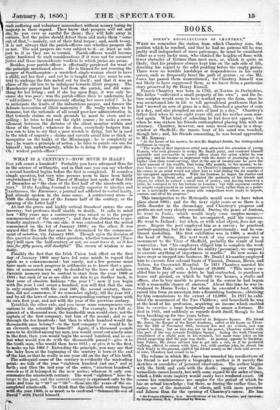WHAT IS A CENTURY ?—HOW MUCH IS HALF ?
CAN ph count a hundred ? Probably you have advanced thus far in the science of arithmetic, and in flat case you can say whether a second hundred begins before the first is completed.. It sounds a simple question, but very wise persons seem to have been fairly overwhelmed by it. The Times of Monday last spoke of that 31st of December as " the close of the first half of the nineteenth cen- tury." If the Leading Journal is royally superior to niceties and 5ractnesses, the Examiner, a journal not addicted to verbal laxity, already spoken in the same sense. A controversy arose—is 850 the closing year of the former half of the century, or the opening of the latter half ? At last the grave and highly critical Standard enters the con- troversy, but professes itself unable to decide. It calls to mind how "fifty years ago a controversy was raised as to the proper commencement of the century "; and then the distinction is pro- foundly analyzed—" On one side, it was contended that the period commenced on the 1st of January 1800; on the other, it was argued that the first day must be determined by the commence- ment of notation, viz. January 1801. Though upon the decision of this question depends the other question, whether tomorrow [Tues- day] will open the half-century or not, we must leave it, as it has lain for Afty years, still doubtful." The crown of wisdom is mo- desty.
Possibly the fact that the Irish Union took effect on the first day of January 1800 may have led some minds to regard that epoch as a commencement : but surely, not a few persona must have made so much progress in arithmetie as to know that a ques- tion of numeration can only be decided by the laws of notation. Juvenile memory may be content to start from the year 1800 or 1801; but such of us as are older are fain to go further back, to that year of obsolete fashions "the year 1 " : now if you begin with the year 1 and count a hundred, you will find that the sum is only complete with the year 100 ; the second century, there- fore, did not commence, if we remember rightly, till the year 101; and by all the laws of sense, each corresponding century began with its own first year, and not with the year of the previous century.
Establish the other rule, and you incur some consequences very curious to the scientific philosopher. For example, in a full re- giment of a thousand men, the hundredth man would obey, not the captain of the first company, but him of the second ; and so on through the ten hundreds : but then to which hundred would the thousandth man belong ?—to the first company ? or would he be an eleventh company by himself ? Again, if a thousand pounds were to be divided among ten men, you would count out ninety-nine to the first, then you would begin the second hundred, and so on : but what would you do with the thousandth pound ?—give it to the tenth man, who would then have 101/. ; or give it to the first, to make up his 1001. ? Extending the principle, you may say that
the baby born at the o. of the century is born at the end of the last, so that he re y is one year old on the day of his birth.
The colloquial name of the century is evidently the misleading paint: we talk of the year " eighteen hundred and one," and so forth ; and then the last year of the series, " nineteen hundred," sounds as if it belonged to the new series ; whereas it only con- summates the nineteenth century. The word " eighteen " here be- , longs to the past, and the current century is expressed only by the units and tens in " '49 " or "150 "—those are the years of the un- completed nineteenth. To think that the nineteeth century began with the year 1800, is as much as to confound "Solomon the son of David " with David himself.






























 Previous page
Previous page